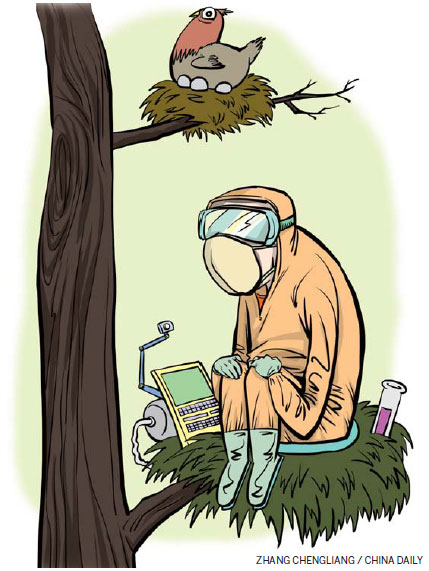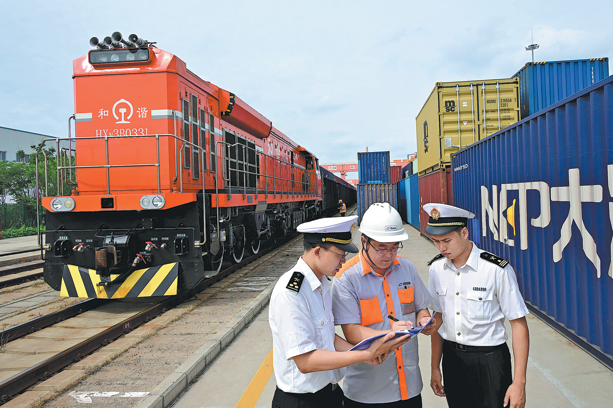Innovation in China: The best and worst of times


'It was the best of times; it was the worst of times." The opening line of English novelist Charles Dickens' A Tale of Two Cities is perhaps an apt description of the status of innovation in China today. In terms of political stability and volume of research funding, few would argue that China is currently in the throes of "the best of times", free from the upheavals and setbacks that checkered the first 30 years of the modern People's Republic of China.
Consequently, what the British philosopher Bertrand Russell envisaged 90 years ago is, on the surface, finally being realized: "If the Chinese could get a stable government and sufficient funds, they would, within the next 30 years, begin to produce remarkable work in science."
Indeed, backed by political support at the highest level, China's science and technology (S&T) capabilities are on a sharply upward trajectory.
Its spending on research and development (R&D) has increased more rapidly than that of overall economic growth. In 2010, the nation spent 706 billion yuan ($103 billion; 85 billion euros) or 1.76 percent of its growing GDP on R&D, putting China second to only the US. In addition, China's R&D personnel reached 2.29 million person-years and it now produces the largest number of undergraduate and postgraduate students, as well as doctorates in science and engineering.
According to Thomson Reuters' Science Citation Index, China ranks second in the world for research output, measured by the number of papers that Chinese scientists have published in journals. Chinese-authored papers rank first in the engineering index. Domestic and international patenting activities involving Chinese inventors have also risen dramatically.
Thanks to reform and opening up, the S&T system has grown in agility and has become responsive to the needs of the economy. Chinese-origin multinational companies - from the computer manufacturer Lenovo and telecommunications firm Huawei to the electric car pioneer BYD -are competing globally.
In contrast, the developed world appears to be submerged in "the worst of times", being not only mired in economic turmoil and political chaos but also significantly short of money even for investment in education and research, which is the lifeblood of any economy.
Research funding has stagnated. Higher education tuition fees have soared. Academics have had their salaries cut and large contingents of foreign students, many from China and India, choose to return to their home countries upon finishing their studies, fearing they will become stuck in a tunnel with no glimpse of light at the end of it.
On the other hand, this is also the "worst of times" for science and innovation in China. There has been a number of cases in which research funding has been wasted or abused - and it may be just the tip of the iceberg.
While quantity of papers and patents has become a yardstick for performance evaluation, China has not witnessed an improvement in quality. Few truly world-class breakthroughs have hailed from Chinese labs and few truly innovative and competitive Chinese products stand out in the global market.
In 2011, the Lasker-DeBakey Clinical Medical Research Award, one of the top honors for life sciences with many awardees going on to win the Nobel Prize, went to the Chinese medical scientist Tu Youyou for the discovery of a new malaria drug that has saved millions of lives in the developing world. The work, however, was achieved during the "cultural revolution" (1966-76) when money was scarce and scientists were under attack.
Research misconduct within Chinese science is serious and widespread, eroding the morale of the Chinese scientific community. According to conservative estimates, one-third of Chinese researchers have engaged in practices such as falsifying data and plagiarism, violating standards of research conduct and undermining public trust. This can in part be attributed to the pursuit of promotion, a hypercompetitive funding environment and the mounting pressure on scientists to produce outcomes with "visibility".
Meanwhile, the institutional watchdog responsible for exposing, investigating and punishing scientific misconduct exists merely on paper because of a lack of autonomy in science and vigorous peer review.
The practice of creating a government agency under political control to police scientists, while denying scientists the autonomy to set up an independent regulatory body, as happens in the West, represents a failure of governance.
A considerable number of Chinese undergraduate and graduate students do not receive a quality education that enables them to meet the demands of the job market. Unemployment among graduates continues to rise.
While some university-bound students opt to go overseas, higher education - traditionally the channel for upward mobility in China - has become a remote dream for many from rural areas and disadvantageous family backgrounds.
Worse, the authorities do not fully recognize the urgent need to further reform the research and education system to meet the many challenges facing China's ambition to become an innovation-oriented nation. Instead, some officials have become complacent and would prefer to maintain the status quo, instead of driving innovation forward in the aftermath of the 2008 global financial crisis.
China needs to act swiftly to take full advantage of the benefits of globalization, remedy the ills of its current science and innovation system, decrease internal friction and use its rising R&D expenditure more efficiently and intelligently. China must make science and technology respond better to the demands of transforming an economy concentrated on labor, capital and resources to one based on knowledge and innovation.
It is often the case that a new technological revolution is brewed amid an economic crisis. If so, it is deeply regrettable that the new revolution is more likely to take place in the West again this time.
It is the ability of Western countries to self-correct that ensures "the worst of times" will pass, like so many previous downturns. The burst of the dotcom bubble at the turn of the century did not bring the demise of innovation to the West. Equally, the current world financial and economic crisis will not signal a crisis of innovation in the West. When the West reemerges from its slumber - it is not a question of "whether" but "when" - the resilience of the system will lead to another steady stream of innovation.
In retrospect, when China was engaged in internal conflicts during the "cultural revolution", the rest of the world witnessed the information technology revolution. It has taken the extreme efforts of China's scientific community to gradually set the ship back on the right course.
Now China's pursuit of science and innovation has reached another critical juncture where any institutional misstep could trap China in a bigger and deeper gap, and jeopardize its potential to become a global scientific superpower.
The author is a senior fellow at the China Policy Institute and an associate professor and reader at the School of Contemporary Chinese Studies, the University of Nottingham. The views do not necessarily reflect those of China Daily.
(China Daily 02/17/2012 page9)
Today's Top News
- CPC holds symposium to commemorate 110th birth anniversary of Hu Yaobang
- Economy seen on steady track
- Trade-in program likely to continue next year
- Li: SCO can play bigger role in governance
- Huangyan Island protection lifeline for coral ecosystem
- Latin America urgently needs green credit






























